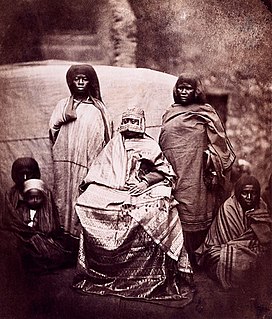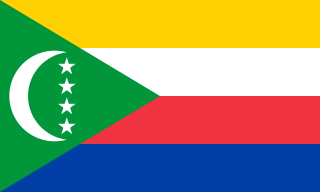
Anjouan is an autonomous high island in the Indian Ocean that forms part of the Union of the Comoros. Its chief town is Mutsamudu and, as of 2006, its population is around 277,500. The total area of the island is 424 square kilometers.

Parliamentary elections were held in the Comoros on 18 April 2004, with a second round on 25 April. The result was a victory for the Camp of the Autonomous Islands, which won 12 of the 18 elected seats.
Colonel Mohamed Bacar was President of Anjouan, one of the three autonomous islands that make up the Union of the Comoros, from 2001 to 2008. He is a former chief of police on Anjouan and has studied extensively in France and the United States. He was part of a military coup on Anjouan in August 2001 and soon became President. It is alleged he rigged the elections to become the first president of Anjouan in March 2002, in part due to his leading role in the separatist movement. He was ousted by the combined forces of the Government of the Union of Comoros and the African Union in the March 2008 invasion of Anjouan.

Elections in the Comoros take place within the framework of a multi-party democracy and a presidential system. The President and the majority of the seats in the Assembly of the Union are directly elected.

Presidential elections were held in the Comoros on 16 April and 14 May 2006. As it was the turn of the island of Anjouan to hold the union presidency, a primary election was held in Anjouan on 16 April, prior to a national election on 14 May. The result was a victory for Ahmed Abdallah Mohamed Sambi, who received 58% of the vote in the national election.

Among men who can afford it, the preferred form of marriage appears to be polygyny with matrilocal residence. Although possible, the first marriage is formally initiated with the grand marriage when possible, subsequent unions involve much simpler ceremonies. The result is that a man will establish two or even more households and will alternate residence between them, a reflection, most likely, of the trading origins of the Shirazi elite who maintained wives at different trading posts. Said Mohamed Djohar, elected president in 1990, had two wives, one in Njazidja and the other in Nzwani, an arrangement said to have broadened his appeal to voters. For men, divorce is easy, although by custom a divorced wife retains the family home.

The invasion of Anjouan, on 25 March 2008, was an amphibious assault led by the Comoros, backed by African Union (AU) forces, including troops from Sudan, Tanzania, Senegal, along with logistical support from Libya and France. The objective of the invasion was to topple Colonel Mohamed Bacar's leadership in Anjouan, an island in the Union of Comoros, when he refused to step down after a disputed 2007 election, in defiance of the federal government and the AU. The Comoros archipelago in the Indian Ocean has had a fractious history since independence from France in 1975, experiencing more than 20 coups or attempted coups.

Parliamentary elections were held in the Comoros on 6 December 2009, with a second round on 20 December. The elections were originally scheduled for July 2009, but were postponed until after a constitutional referendum was held in May 2009. They were then scheduled to take place on 29 November, but were delayed again. The result was a victory for the Baobab Movement, a coalition supporting President Ahmed Abdallah Mohamed Sambi.

Presidential elections were held in the Comoros on 7 November 2010, with a second round on 26 December, alongside gubernatorial elections for the three main islands. The result was a victory for Ikililou Dhoinine, who received 61% of the vote.

Parliamentary elections were held in the Comoros on 7 March 1982, following the early dissolution of the Federal Assembly by President Ahmed Abdallah on 25 January. There were 38 constituencies, each of which elected a single member. In February the Comorian Union for Progress had been created as the sole legal party, and its candidates won 37 of the 38 seats.

Presidential elections were held in the Comoros on 4 March 1990, with a second round on 11 March. The elections had originally been scheduled for January, but were postponed, resulting in demonstrations. Elections were held on 18 February, but were abandoned due to fraud allegations.

Presidential elections were held in the Comoros in 2002. In accordance with the new constitution approved in a referendum the previous year, the island of Grande Comore was to provide the candidates for this election as part of a rotation agreement between the three islands. A first round was held on Grande Comore on 17 March, after which the top three candidates, Azali Assoumani, Mahamoud Mradabi and Saïd Ali Kemal went through to a second, national round of voting on 14 April. However, both Mradabi and Kemal boycotted the second round, leaving first round winning Assoumani as the only candidate.

Parliamentary elections were held in the Comoros on 22 November 1992, with a second round on 29 November 1992. Due to electoral irregularities in the initial elections, there were also by-elections in six of the 42 constituencies on 13 and 20 December.

Early parliamentary elections were held in the Comoros on 12 December 1993, with a second round in all but four seats on 20 December. The elections were held after President Said Mohamed Djohar dissolved the Federal Assembly elected in November 1992.

Ikililou Dhoinine is a Comorian politician who was the President of the Comoros from 2011 to 2016; he was a Vice-President of Comoros from 2006 to 2011.

Comoros competed at the 2012 Summer Olympics in London, England, which was held from 27 July to 12 August 2012. The country's participation at London marked its fifth appearance in the Summer Olympics since its début at the 1996 Summer Olympics. The delegation included two track and field athletes: Maoulida Darouèche and Feta Ahamada, and one swimmer, Ayouba Ali Sihame, all three qualified for the Games through wildcard places. Ahamada was selected as the flag bearer for the opening ceremony and Darouèche held it at the closing ceremony. Ahamada won her heat in the preliminary round of the women's 100 metres but was eliminated in the heat stages, while Darouèche and Sihame did not advance beyond the first round of their respective events.

Presidential elections were held in the Comoros on 21 February 2016, with a second round to be held on 10 April 2016, alongside elections for the Governors of the three islands. Azali Assoumani of the Convention for the Renewal of the Comoros was elected President with 41% of the vote.

Legislative elections were held in Comoros on 25 January 2015, alongside local elections. A second round of voting was held on 22 February in the 21 constituencies where no candidate won in the first round. The Union for the Development of the Comoros emerged as the largest party, winning eight of the 24 seats in the Assembly of the Union.

Early presidential elections will be held in the Comoros on 24 March 2019 alongside regional elections. If required, a second round will be held on 21 April.







